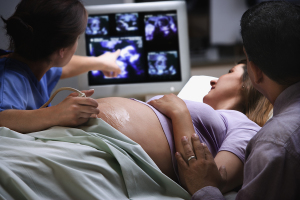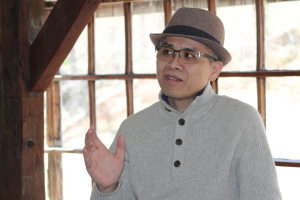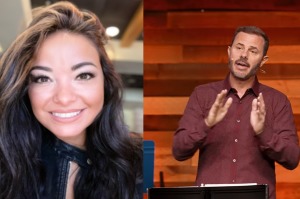God and Election Day: Why Pray If You Can Worry?
Although he was not educated, my father was wise. He never finished the 10th grade, yet he put together and constantly used a serious personal library for Bible-study and guidance in the Christian life. He also loved to give testimony to the redeeming work of the Lord in his and others' lives.
When people around him seemed stressed, worrying, such as in deep concern about an impending major election – people not trusting God, not faithfully praying – he would often then say, "Why pray if you can worry?"
Not understanding his clever irony, someone in the conversation would usually try to correct him. "No! John, you should say, 'Why worry if you …'," stopping mid-sentence when Dad's big smile gave away his shrewd purpose. You cannot pray and worry at the same time. So my wise Dad believed and taught, with humor.
Serious prayer is a sign that we believe that all our voiced concerns are in good hands, the best hands – the Lord's hands. Even when other people's votes and decisions deeply affect all our futures, God is able to over-ride, over-rule, and over-bless each of us. This is clear in our most elemental confession of faith: "Jesus Christ is Lord." He is sovereign, he is in charge. Not, "Jesus Christ will be Lord," but he is Lord now. Nothing happens without his permission and purpose. We are truly in good hands, the grace-filled Hands – and far better than we deserve.
Yet our worries are signs that we are not sure that God is in control, not confident he is in charge. We know that people can be willful – we ourselves and others – not always fulfilling God's well-known purposes, not obeying his principles – in voting booths and everywhere else. Could our human free-will lead to rebellion or chaos, threatening the Lord's authority? There always are better options than worrying; working for the right is far better than worrying about the wrong, any day. Still, if our future is in our human hands, how is it also in the Lord's hands?
The remaining, enduring puzzle is: If the Lord always gets his way, why vote at all? And if we all have free-will, how can Jesus be Lord? And if every vote matters, how does the Lord make everything work together for good? Both our experience and the Bible teach us that both facts are true – (a) we have free-will and responsibility, and (b) Jesus Christ is nowLord. We even experience both Biblical realities. Moreover, these two opposing claims even show up together in several Scripture references, in blatant Biblical paradox. Consider two very familiar passages that start with a free-will claim, and yet affirm total Divine control in the next phrases:
o Work out your own salvation with fear and trembling, for it is God who is at work in you both to will and to work for his good pleasure. - Philippians 2:12-13
o For God so loved the world that he gave his only Son, so that everyone who believes in him may not perish but may have eternal life. Indeed, God did not send the Son into the world to condemn the world but in order that the world might be saved through him. - John 3:16-17 [It all depends on our freely believing, while it all depends on his sovereign saving.]
Now, there are simply three options for us to handle this objective Biblical and experiential paradox: Some become "Arminian" and deny the multitude of Biblical and experiential evidences of God's sovereign grace and power. Some others become "Calvinist" and deny the multitude of Biblical and experiential evidences of human free-will and responsibility. However, I think it is far better to embrace this third, objective Biblical and experiential paradox: In God's extraordinary sovereignty, he created human free-will. We can faithfully trust the Sovereign Lord and his awesome, amazing Grace – while we fully embrace our awesome human responsibilities and free-will, too.
John Wesley wisely taught, "Work as if it all depends upon us, and pray as if it all depends upon God" – and then we will be right all the time. All will be in good company, too, because every academic discipline has one or more radical paradox at its very core. [See our www.xparadox.com.] All these different sciences and disciplines of study deeply and accurately reflect the paradoxical ways of our Creator and Savior – as we would expect – even if many scientists are strangely blind to his subtle Presence and his splendid paradoxes. What brilliant humor our Creator has to boggle every genius's mind! Even our daily lives include a variety of paradoxes of Biblical proportions.
How excellent these paradoxes are! The most Godly human will never claim to understand completely the Lord and his ways. After all, how could the Infinite become the Infant? Yet we freely, fully affirm this elemental, human incongruity – this profound paradoxical truth of Christmas, and so deeply relevant the whole year long. This simple Christmas paradox still sets the standard!
Can we let God be God? Can we seek his wisdom and still freely choose? Can we pray and trust God – and still work hard for our favorite political candidates? Can we completely trust our Lord's sovereign authority and amazing grace – and still vote and live responsibly?
Let us invite all voting Americans to approach the November 6 elections in extraordinary peace, shalom. Why worry or fret? Instead, (1) please read the Scriptures honestly receiving God's principles, and in the Spirit's guidance (2) please pray for and trust bold Divine wisdom for our lives and times, (3) please consult with seasoned believers for their guidance, and (4) please vigilantly honor Jesus in the way you vote for our future leaders on November 6. Openly urge others to vote with you, too. After all, such Godly voting shows that the eternal principles matter, for God's will to be done on earth as it is in heaven. Otherwise, how can we pray?
After voting, put it all in the Lord Jesus' hands, where it has been all along. Then embrace the splendid paradoxical shalom he brings.




























